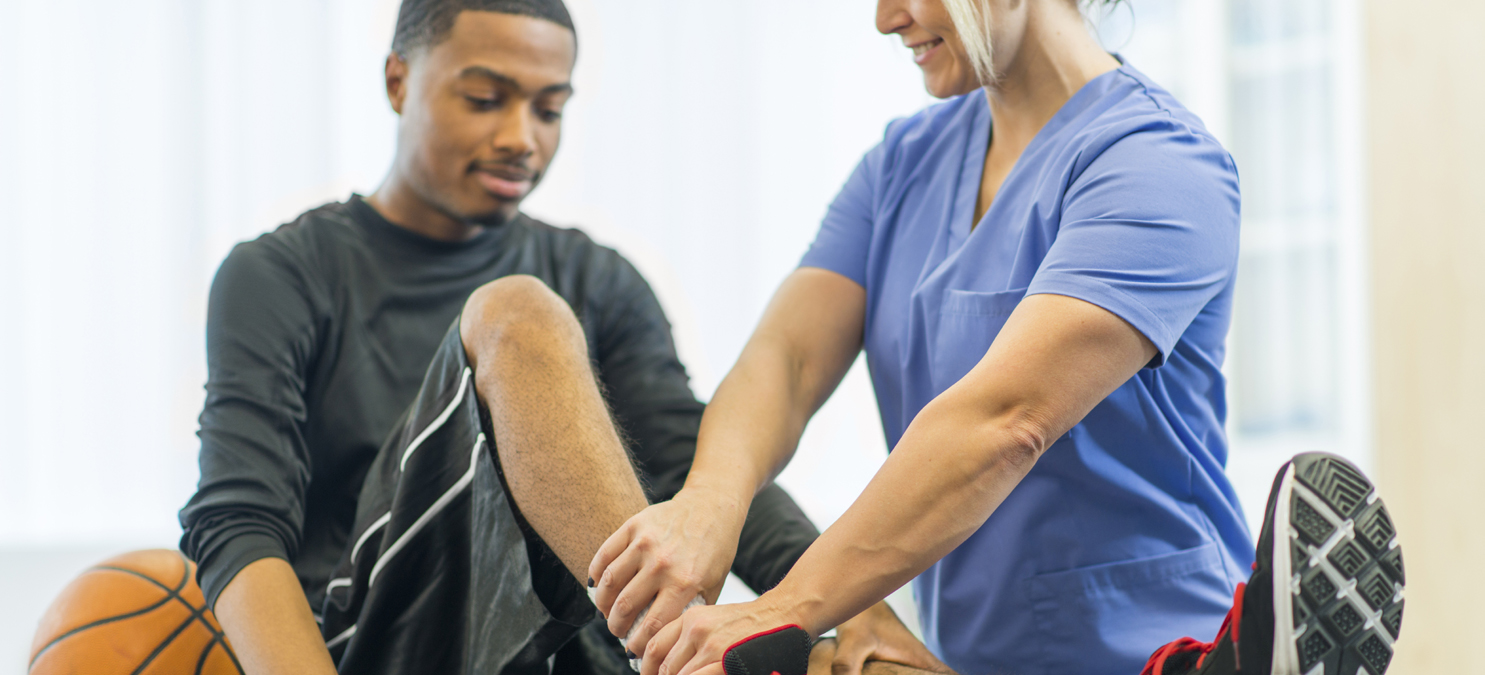What Do Athletic Trainers and Exercise Physiologists Do?
Athletic trainers specialize in preventing, diagnosing, and treating muscle and bone injuries and illnesses. Exercise physiologists develop fitness and exercise programs that help patients recover from chronic diseases and improve cardiovascular function, body composition, and flexibility.
Athletic trainers work with people of all ages and all skill levels, from children to professional athletes and soldiers to industrial workers. They are usually one of the first health care providers on the scene when injuries occur during sports games. They work under the direction of a licensed physician and with other health care providers, and often discuss specific injuries and treatment options or evaluate and treat patients as directed by a physician. Athletic trainers will assess, recognize, and evaluate injuries; provide first aid or emergency care; develop and carry out rehabilitation programs for injured sports enthusiasts and athletes; plan and implement comprehensive programs to prevent injury and illness; and perform administrative tasks, such as keeping records and writing reports on injuries and treatment programs.
Exercise physiologists work to improve overall patient health, and many of their patients suffer from health problems such as cardiovascular disease or obesity. Exercise physiologists provide health education and exercise plans to improve key health indicators. Some exercise physiologists work closely with primary physicians. Exercise physiologists will analyze a patient’s medical history to determine the best possible exercise and fitness regimen; perform fitness tests with medical equipment and analyze the subsequent patient data; measure body fat, blood pressure, oxygen usage, and other key patient health indicators; develop exercise programs to improve patient health; and supervise clinical tests to ensure patient safety.
For additional information, go to: https://www.bls.gov/ooh/healthcare/athletic-trainers.htm and https://www.bls.gov/ooh/healthcare/exercise-physiologists.htm
Where Do Athletic Trainers Work?
Many jobs for athletic trainers are sports related, although there are non-sports related jobs available, too. Athletic trainers work in colleges and universities, high schools, fitness centers, professional athletic organizations, and health care organizations. Many athletic trainers work in educational facilities, such as secondary schools and colleges. Others may work in physicians’ offices or for professional sports teams. Some athletic trainers work in rehabilitation and therapy clinics, in the military, or with performing artists.
Exercise physiologists work in hospitals, outpatient clinics, and university laboratories. They may also work in fitness centers and with health care organizations.
For athletic trainers and exercise physiologists who work in health care settings, hours and schedules may be more structured. For those who work in fitness centers, sports settings, or with sports teams, their schedules may vary greatly, with longer than eight-hour days sometimes, and some nights and weekends required.
For more information on projections of athletic trainers and exercise physiologists by New York State labor regions, 2014-2024, click here.
What Do Athletic Trainers Earn?
In 2022, the average annual income reported by the Bureau of Labor Statistics (BLS) for athletic trainers in the United States was $57,810 while the average income for exercise psychologists was $55,810. The New York State Department of Labor (NYSDOL) reports that, in 2023, athletic trainers in New York earned a median annual salary of $63,385 (athletic trainers in the 25th percentile made approximately $47,303 while those in the 75th percentile made approximately $77,940) while exercise psychologists earned a median annual salary of $67,217 (exercise psychologists in the 25th percentile made approximately $49,372 while those in the 75th percentile made $84,736).
For more information on projections of athletic trainers by New York State labor regions, click here.
Supply and Demand
According to U.S Bureau of Labor Statistics projections, employment of athletic trainers is projected to grow by 17% nationwide between 2021 and 2031 and employment of exercise psychologists is expected to grow by 9% during the same time period. According to the New York State Department of Labor, employment of athletic trainers in New York is projected to grow by 34% between 2020 and 2030 and employment of exercise physiologists is expected to grow by 18% during the same time period.
New York Educational Requirements
Athletic trainers and exercise physiologists need at least a bachelor’s degree from an accredited college or university. Master’s degree programs are also common in both professions. Both athletic training and exercise physiologist degree programs have classroom and clinical components, including science and health-related courses, such as biology, anatomy, physiology, physics, and nutrition.
In New York, certified athletic trainers have a minimum of a bachelor’s degree from an athletic training program that is registered by the New York State Education Department as licensure qualifying. Exercise physiologists have a minimum of a bachelor’s degree in exercise physiology and may choose to become board certified by the American Society of Exercise Physiologists (ASEP).
New York Certification/Licensure Requirements
New York mandates that all individuals using the title “certified athletic trainer” be licensed. To become licensed, individuals must have graduated from an accredited educational program or meet minimal course work requirements as specified by the New York State Education Department. For more information on the requirements, go to http://www.op.nysed.gov/professions/athletic-training/license-requirements
To meet the examination requirements for licensure as a certified athletic trainer, an individual must obtain satisfactory scores on athletic training examinations acceptable to the New York State Education Department. The certification examination of the National Athletic Trainers Association (NATA) Board of Certification, Inc. (BOC) is an acceptable examination. For more information on that examination, go to www.bocatc.org. For more information about accreditation, go to the Commission on Accreditation of Athletic Training Education: www.caate.net.
Licensure for exercise physiologists is not required in New York. Compared to athletic trainers, licensure for exercise physiologists is less common and, therefore, there are fewer recognized standards of practice for exercise physiologists. Nonetheless, exercise physiologists can stand out by earning professional certifications in their field. The American College of Sports Medicine (ACSM) offers a Registered Clinical Exercise Physiologist certification for graduate degree holders and a Certified Clinical Exercise Specialist credential is available to bachelor’s degree holders.
Financial Support
NATA offers several types of scholarships, including the NATA Foundation Scholarship Program which awards undergraduate, master’s, and doctoral scholarships to students of athletic training. Information can be found at: https://natafoundation.org/education/scholarships/. Also, NATA has additional information about studying to become an athletic trainer and financial aid and scholarships programs for students at https://www.nata.org/professional-interests/students. The New York State Athletic Trainers’ Association also has information on scholarships and awards. ACSM Foundation offers some awards and grants. These may be found at: https://www.acsm.org/acsm-membership/support-acsm-foundation .
Education Programs in New York (subject to change)
| Alfred University 1 Saxon Drive Alfred, NY 14802 (607) 871-2111 |
Canisius College 2001 Main Street Buffalo, NY 14208-1517 (716) 888-2200 |
| Dominican College 470 Western Highway Orangeburg, NY 10962 (845) 359-7800 |
Hofstra University 101 Hofstra Dome Hempstead, NY 11549 (516) 463-6600 |
| Ithaca College 953 Danby Road Ithaca, NY 14850 (607) 274-3011 |
Marist College 3399 North Road Poughkeepsie, NY 12601 (845)-575-3000 |
| The College at Brockport-SUNY Exercise Science and Athletic Trainer 350 New Campus Drive Brockport, NY 14420 (585)-395-2211 |
SUNY Cortland 21 Graham Ave Cortland, NY 13045 (607) 753-2011 |
| Stony Brook University- SUNY 101 Nicolls Rd Stony Brook, NY 11794 (631) 444-2252 |
Kingsborough Community College 2001 Oriental Blvd Brooklyn, NY 11235 (718) 368-5000 |
| Bronx Community College Exercise Science 2155 University Ave Bronx, NY 10453 (718) 289-5895 |
Rochester Institute of Technology Exercise Science 1 Lomb Memorial Drive Rochester, NY 14623 (585) 475-2411 |
| SUNY Morrisville Human Performance and Heath Promotion 80 Eaton St. Morrisville, NY 13408 (315) 684-6000 |
SUNY Potsdam Exercise Science 44 Pierrepont Ave Potsdam, NY 13676 (315) 267-2000 |
| Syracuse University Exercise Science 900 S Crouse Ave Syracuse, NY 13244 (315) 443-1870 |
Onondaga Community College Exercise Science 4585 W Seneca Turnpike Syracuse, NY 13215 (315) 498-2000 |
| Columbia University Teachers College Movement Science & Education 525 W 120th St New York, NY 10027 (212)678-3000 |
Hudson Valley Community College Exercise Science 80 Vandenburgh Ave Troy, NY 12180 (518) 629-4822 |
| Mercy College Exercise Science 555 Broadway Dobbs Ferry, NY 10522 (914) 674-7600 |
University at Buffalo Exercise Physiology Concentration/ Athletic Training MS 12 Capen Hall Buffalo, NY 14260 (716) 645-2000 |
| Skidmore College Health & Human Physiological Science 815 N Broadway Saratoga Springs, NY 12866 (518) 580-5000 |
Dutchess Community College Exercise Science 53 Pendell Rd Poughkeepsie, NY 12601 (845) 431-8000 |
Additional Web Links
For more information on Athletic Training, go to the Board of Certification: www.bocatc.org, the Office of the Professions, New York State Education Department: www.op.nysed.gov/, the National Athletic Trainers Association: http://www.nata.org/, and the New York State Athletic Trainers’ Association.
For more information on Exercise Physiology, go to the American Society of Exercise Physiologists (ASEP) and American College of Sports Medicine (ACSM).
[whohit]Athletic Trainers and Exercise Physiologists[/whohit]

